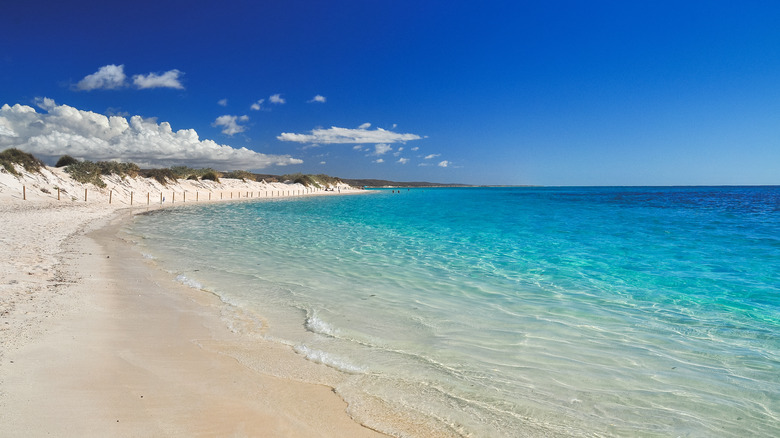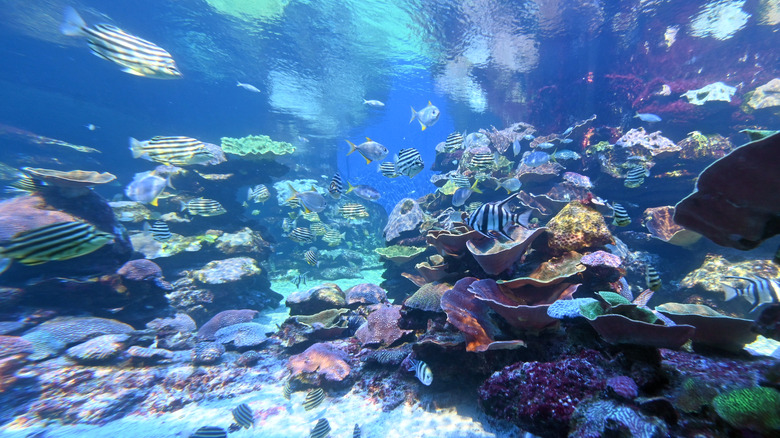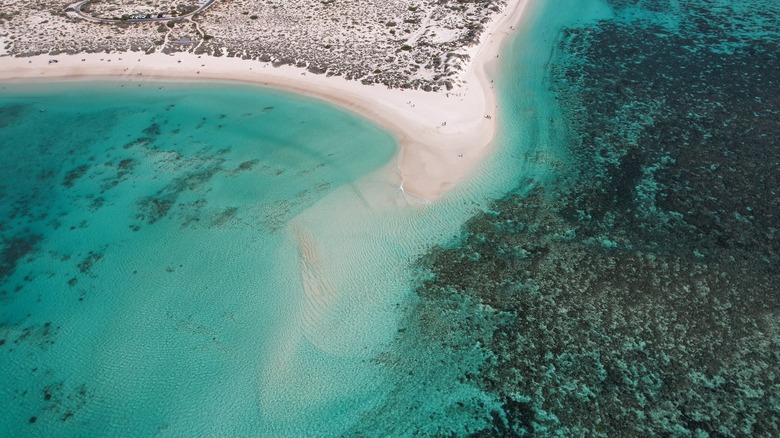Swim In Some Of The World's Most Radiant Turquoise Water At One Of Australia's Best-Ranked Beaches
The results for the World's 50 Best Beaches 2024 are in, and out of Australia's three that made the list, Turquoise Bay scored the highest, ranking in sixth place overall. Alongside its most recent world beach accolade, Turquoise Bay took the number one spot in Tripadvisor's Best of the Best Beaches in the South Pacific category in 2022, further showcasing its impressive reputation of excellence. Situated on the west coast within the confines of Cape Range National Park, this remote beach lives up to its namesake, wowing visitors with its incredibly clear turquoise water, offering that quintessential tropical paradise beach that vacationers crave.
The clarity of the water also makes it an optimal snorkeling destination, with high visibility levels making it easy to marvel at marine life. So, whether you're looking for a beautiful beach to simply kick back, relax, and enjoy the view or want to uncover what lies beyond the shores by exploring the coral reef, Turquoise Bay is the perfect destination. "Hands down the best beach in the area – the sand is powder white, and the water is clear, clean, and turquoise. We visited many of the beaches up and down this coast, and this was our favorite. We kept returning here during our stay ... I see why it has won the Best Beach award. I would rate it one of my top 10 worldwide," shared rochelleforster on Tripadvisor. It's little wonder that so many people consider Turquoise Bay to be a top Australian coastal getaway destination.
What makes Turquoise Bay so special?
The reefs at Turquoise Bay are part of Ningaloo Marine Park — recognized by UNESCO — which spans across 200 miles along the coastline. The Marine Park is headed by the Western Australian Department of Biodiversity, Conservation and Attractions, offering the reef a protected status where conservation is prioritized. Its remote location makes it the ultimate bucket list location for beach lovers, particularly because it is not as crowded as other beaches in Australia.
Turquoise Bay is split into two zones: the Bay Loop and the Drift Loop. Bay Loop on the northern side is the ideal spot for those looking to take a dip in the sea and sunbathe in the crystal-clear, warm water. Here, currents are not as strong as those in the south sandbar, making it a safer spot for families. Despite the fact there isn't as much to see underwater in this area, it is still breathtakingly beautiful.
The Drift Loop area offers more diversity of fish and sea creatures. A natural current flows from south to north, allowing you to gently float along the reefs. Be careful, though, not be pulled out to sea by paying close attention to markers. It's important to take care and safely snorkel around coral reefs to ensure the longevity of marine life in the area — It's easy to make mistakes when snorkeling for the first time. The coral reefs at Turquoise Bay are home to over 200 types of coral and hundreds of types of fish, mammals, and reptiles. Alongside a myriad of colorful fish and sea anemones, visitors to Turquoise Bay have also shared sightings of whitecap reef sharks, eagle rays, cowtail stingrays, and sea turtles. This biodiversity is a testament to the health of this protected underwater area.
Making the most of your visit to Turquoise Bay
Getting to Turquoise beach requires visiting Cape Range National Park, which is closest to the resort town of Exmouth, located approximately 30 miles away. The easiest way to access the beach is to take a scenic 45-minute drive from town into the park, perhaps stopping to admire the rock formations and incredible diversity of flora and fauna en route. Outdoor enthusiasts will be able to make the most of their visit, participating in hiking trails or camping inside the park.
While the beach itself is free to enter and accessible all year round, park entry fees do apply. If you're arriving in a standard vehicle (carrying fewer than 12 passengers), entry to the park costs about $11 for the vehicle. The fee for motorcyclists is around $7. If you are looking to visit several parks on your trip to Australia, then purchasing an All Parks Pass for $88 per vehicle may be a good value option. It's also worth noting that pets are not allowed in the park or at the beach, and that there are basic amenities at Turquoise Bay, such as toilets, a picnic deck, and a parking lot. Decking allows the beach to be accessible by those with limited mobility.


